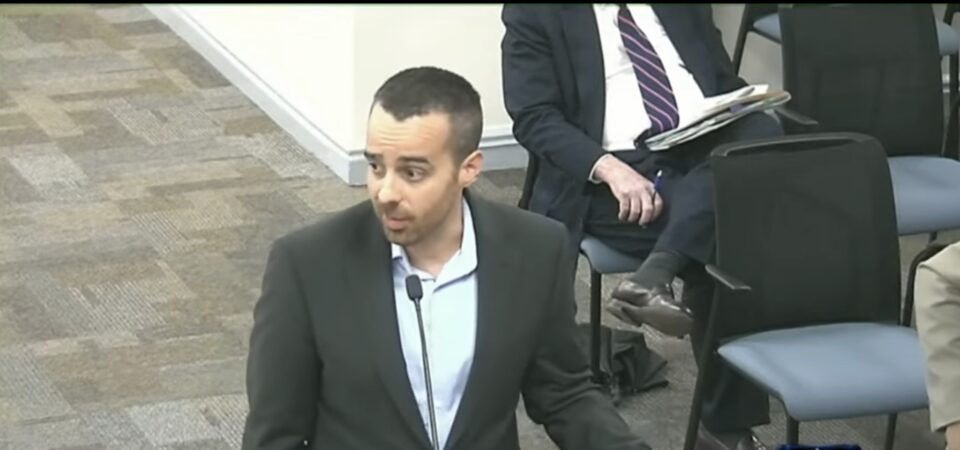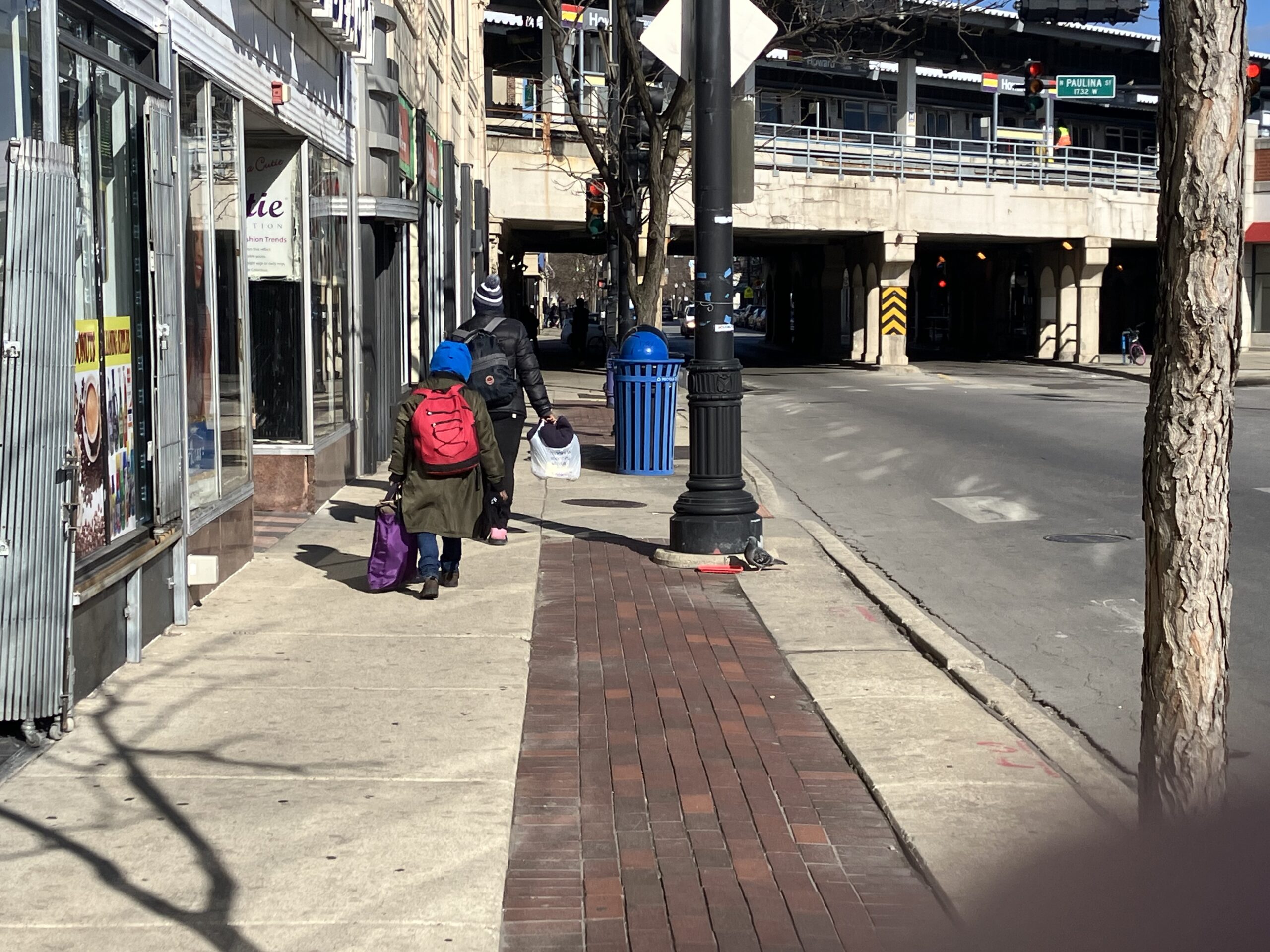By Bob Seidenberg
The Evanston City Council awarded employee groups with substantial pay increases this year, taking into account the cost-cutting measures workers had agreed to as the city grappled with losses during the early part of the COVID-19 pandemic.
As the city enters its budget season, several things are shaping up as key concerns for city officials: the more than $10 million in increases to employee salaries in 2024; the move away from issuing long-term bonds as a financing tool; a commitment to fully fund public safety pensions; and other new expenses.
Clayton Black, the city’s budget manager. Credit: City of Evanston YouTube
At the Sept. 11 City Council meeting, city officials presented a midyear report on revenues, expenses and trends they will follow as they draw up the proposed budget for fiscal year 2024.
That document is scheduled to be released Oct. 6. Council members will then hold discussions over the next month, leading to the adoption of a final document – likely before Thanksgiving – that shows how the city plans to use its resources.
Members of the council who took office in May 2021 will face arguably their first major budget challenge. The $43.1 million windfall in federal COVID-19 relief funds the city received just before they took office is all but gone, having been used to bolster reserves and pay for certain capital expenditures as well as a number of programs on the outside.
Revenues hold their ground
Officials are projecting to finish the current fiscal year with revenues $10 million over budget “at the low end” and $13.3 million “on the high end,” said Clayton Black, the city’s budget manager, in a presentation to the council he made with Hitesh Desai, the city’s chief financial officer and treasurer.
Most shared state revenues are trending near 2022 levels, with sales tax revenues (3%) and home rule tax revenues (4%) trending up in 2023, Desai reported.
Through July, real estate transfer tax revenues are down 29% compared with 2022. The first $3 million of that fund is earmarked to go to the city’s reparations fund.
Money from the personal property replacement tax is down 17% through July, Desai said, compared with 2022 figures. Some members of the city’s Finance & Budget committee have looked at tapping the revenues from that tax to bolster pension payments.
Desai said several local revenues that go into the city’s general fund are on pace to meet or exceed budget. These include recreation program fees, building permits, ticket fines for parking and ambulance fees as the city, some of which were down during the worst of COVID-19.
Overall, Black told the council, “revenues are trending extremely well. Many of the revenues trends we saw last year, with the exception of a few revenues that Hitesh mentioned, … are projected to finish the year at or above what the budget was.”
Expenses adding up
“That said,” he continued, “the City Council has approved a handful of things this year, and few other items tonight, that will likely result in increased spending on items that were not budgeted.”
Those expenses include, he said, a handful of overages on capital improvement projects as well as higher-than-budgeted wage increases.
Northlight Theatre Birthday Candles 8/31-9/30/23
For police salaries, Black said, officials had budgeted for a 4½% increase and it came in at 18%. For firefighters, the council approved an 11% increase compared with the 4½% originally budgeted. The contract approved by the council at that night’s meeting for the more than 300 city employees represented by the American Federation of State, County and Municipal Employees calls for wage increases totalling 20% through 2026.
The city’s reserve fund should finish the current fiscal year with a fund balance of $26 million to $29 million over the required reserves that are to be set aside under city policy, he said.
Revenues, while continuing to be pretty strong in many cases, have likely peaked, Black said.
Given those factors, the city’s budget officials outlined a number of concerns moving into the 2024 fiscal year budget.
They include:
— Salary increases: Given the approved labor contracts, the city’s employee costs in 2024 will be more than $10 million higher than the 2023 budget.
— Pension contributions: The council has approved a policy to put long-underfunded public safety retirement pensions on track to be 100% funded by 2040.
— Capital improvements: The city is developing a capital improvement plan for major projects, with no bonds issued in 2022 or 2023 and continued use of general fund reserves. With bonding in question, officials have identified challenges related to funding projects, ranging from water main replacement and lead service line work to a long list of park infrastructure needs.
— Vehicle replacements: The city needs to plan for vehicle expenses, including an estimated $1.25 million needed for vehicle replacement costs not covered by the city’s dwindling American Rescue Plan Act funds, as well as increased spending to buy more costly electric vehicles ($750,000). “With our ARPA relief funding the last two years, the general fund has had a break from covering the cost of vehicles,” Black told the council. “But with ARPA money running out, the general fund has to take that responsibility back on, and that’s about $2 million a year.”
City panel split over use of bonds
In a presentation at the Sept. 12 Finance & Budget Committee meeting, Lara Biggs, chief of the city’s Bureau of Capital Planning and Engineering, told the committee that of the city’s neighborhood parks, “11 have had no appreciable infrastructure investment for at least 26 years.”
Finance & Budget Committee members have been split over the city’s extensive use of bonds to finance projects, generally over a 20-year-period, to avoid the steep hikes in property taxes that would come from paying for them all at once.
They point to the Robert Crown Community Center project, which ran more than $20 million over budget, according to one estimate, and which has the city making debt service payments close to $3 million annually starting this year and running until 2043.
While staffing is almost back at full strength after the cutbacks during COVID-19, Black said the items enumerated in the report total about $20 million in increased 2024 expenses that were not in this year’s budget “that we’re going to have to figure out how to be able to pay for as part of this budget.”
In a brief council discussion after the presentation, Council Member Clare Kelly (1st Ward), who also serves on the Finance & Budget Committee, thanked officials for their report, taking note that “it looks like we have a better projection of surplus budget [funds] this year, potentially $30 million in excess above reserves.”
She also said the city has reserves built into a number of other funds and asked officials for an accounting. “I think for the public to know how much we set aside total. … I think it’s just a useful number to have,” she said.
‘Really sobering stuff‘: mayor
Mayor Daniel Biss also thanked officials for the presentation.
In officials’ report a year ago, he recalled, “I said, ‘You know, we’ve got a really, really excellent cash position and a lot of challenges coming ahead. At some level, the same could be said today, except that it’s even more obvious the extent of the upcoming challenges.
“As an aside, I would argue we shouldn’t be particularly surprised the main – the most significant – change in our anticipated expenditures this year was in employee contracts, which, given the labor market and the inflation that we’re experiencing, was entirely predictable.”
At the same time, Biss said, “For all the good news in here, there’s really sobering stuff as well.
advertisement for Law Office of Jeffrey P. Story, LLC: Elder Law, Trust & Estate Law
“I think we’re going to have to be very, very restrained as we look at it, for instance, expansion of [employee] headcount and taking out of other obligation, particularly long-term obligations,” he said.
“And I just think, in general, even outside the context of the annual budget discussion, as a body we’re going to have to be really, really careful in analyzing both potential new expenditures as well as potential new revenues, especially potential new expansions in the tax base.
“I think that’s going be difficult for all of us, but it’s absolutely necessary if we want to – notwithstanding the upcoming challenges – leverage the assets we have to find ourselves in a long-term healthy position.”




